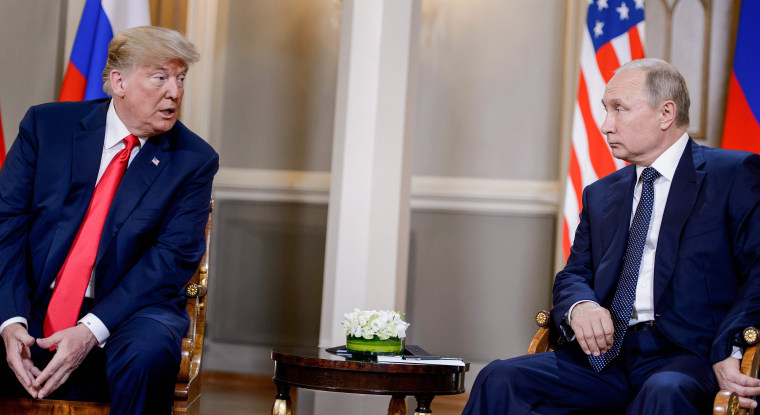On the eve of Donald Trump's bilateral talks with Russian President Vladimir Putin, U.S. Ambassador to Russia Jon Huntsman said the one-on-one discussion should be seen as "meeting," not a "summit."
Apparently, his boss disagrees: Trump has described the gathering in Helsinki as a "summit."
In the grand scheme of things, the fact that the president and his ambassador to Russia disagree on what to call today's talks is minor, but as the New York Times noted, this unfolded against a backdrop in which Trump and the rest of his team routinely draw dramatically different conclusions when it comes to U.S. policy toward to Russia.
Whether it is Russia's interference in the election, its annexation of Crimea or its intervention in Syria, Mr. Trump's statements either undercut, or flatly contradict, those of his lieutenants.The disconnect is so profound that it often seems Mr. Trump is pursuing one Russia policy, set on ushering in a gauzy new era of cooperation with Mr. Putin, while the rest of his administration is pursuing another, set on countering a revanchist power that the White House has labeled one of the greatest threats to American security and prosperity.
The contradictions are jarring, though the underlying question -- should we listen to administration officials or their boss about U.S. policy toward Russia? -- has a clear answer.
A few months ago, for example, after Putin won another term -- in an "election" in which his rivals were not allowed to compete -- his White House national security advisers prepared briefing materials with an all-caps reminder for Trump ahead of his call with the Russian leader: "DO NOT CONGRATULATE."
Trump ignored the guidance, which fits into a larger pattern. The Washington Post had an interesting report along these lines two weeks ago.
In November and again in March, Trump invited Putin to the White House for a summit against the advice of aides, who argued that the chances of progress on substantive issues was slim. [...]With Putin, Trump takes a more conciliatory approach [than he does with the leaders of traditional U.S allies], often treating the Russian leader as a confidant."So what do you think I should do about North Korea?" he asked Putin in their November 2017 telephone call, according to U.S. officials.
The New York Times reported last week, meanwhile, that during one chat with Putin, Trump described members of his own team, who'd warned him about the Russian leader, as "stupid people."
When we hear from administration officials this week about how tough the Republican president was with Putin, it's worth keeping in mind that when it comes to Russia, Trump seems to have his own plan in mind.
